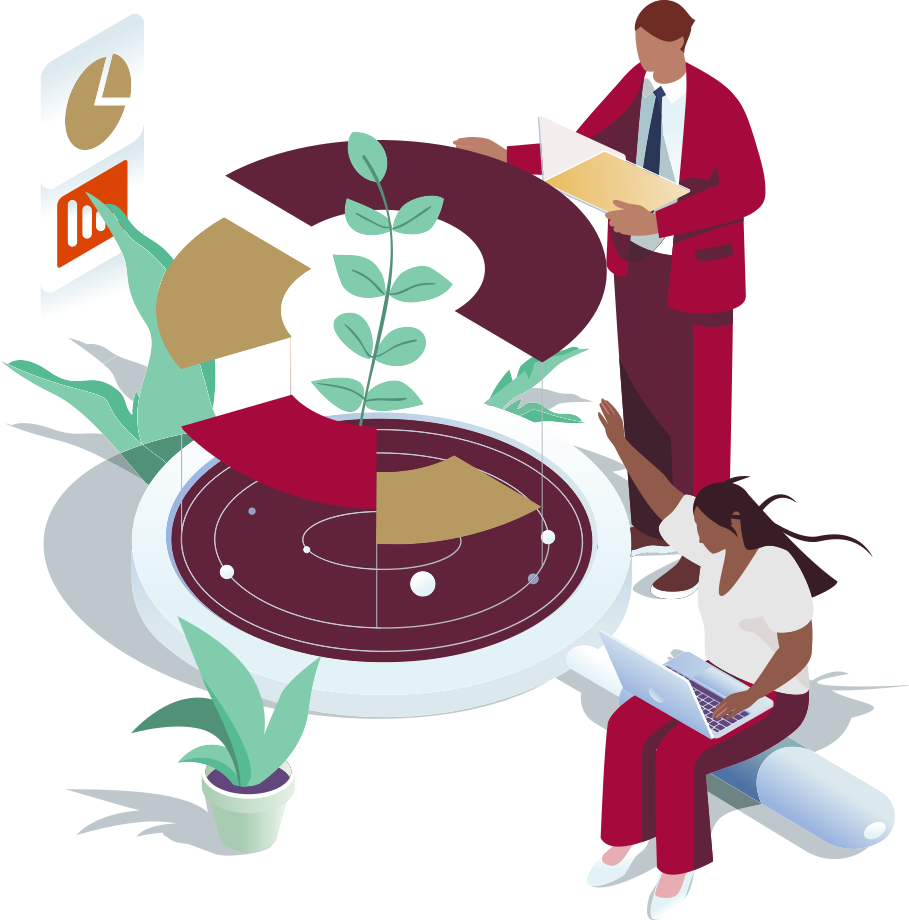Sustainable Development
at STELLENBOSCH UNIVERSITY
Sustainable Development Agendas
Areas of Reporting
This section highlights some of Stellenbosch University’s contributions to the Sustainable Development Agendas – the UN’s SDGs and the Agenda 2063 Goals.

Research
One of Stellenbosch University’s core aims as part of Vision 2040 is to become Africa’s leading research-intensive university with a global reach and focusing on research for impact. Stellenbosch University aims to contribute to the progress of the SDGs by conducting research that is of a high standard and is applicable to the struggles facing humanity today and in the future.
SU is currently home to a School for Data Science and Computational Thinking and a School for Climate Studies, in addition to seven Centres for Excellence:
- National Institute for Theoretical and Computational Sciences
- Centre for Renewable and Sustainable Energy
- Stellenbosch University Water Institute
- DSI-NRF Centre of Excellence for Biomedical TB Research
- DSI-NRF Centre of Excellence for Invasion Biology
- Scientometrics and Science, Technology, and Innovation Policy
- South African Centre for Epidemiological Modelling and Analysis
The Centres of Excellence produce research that is of international quality and is relevant to the SDGs. The Centre for Renewable and Sustainable Energy has housed many research projects over several departments and research groups. The Centre of Excellence for Invasion Biology conducts research into the impacts that invasive species have on South African flora and fauna. The South African Centre for Epidemiological Modelling and Analysis conducts research on various health threats, including TB, HIV/AIDS, diabetes and recently, Covid-19. There are several specialist researchers at SU who focus on sustainability across departments.
Stellenbosch University is committed to conducting ethical research and the University has five Ethics Review Committees, which focuses on different aspects of research ethics:
- Social, Behavioural and Education Research Ethics
- Health Research Ethics Committee 1
- Health Research Ethics Committee 2
- Animal Care and Use Ethics
- Biosafety and Environmental Ethics
Stellenbosch University is committed to making the research done at the University accessible to the public and employs several avenues to do so. The University publishes an Annual Research Report to share the innovative and impactful research done at the University. The Division for Research Development publishes a bimonthly newsletter to highlight current research and achievements of SU researchers and the podcast, Talks at Stellenbosch University, features many Stellenbosch researchers and academics who share their knowledge and research with the public.
Teaching
As a leading Higher Education Institution in Africa, Stellenbosch University graduated more than 5 600 students in 2021, of which 677 were at Master’s level.
There are various qualifications that can be obtained in Sustainable Development:
- A new, one-year Advanced Diploma in Sustainable Development was launched in 2021
- Short courses in Renewable and Sustainable Development
- Postgraduate Diploma in Sustainable Development
- Postgraduate Diploma in Environmental Management
- Master of Philosophy in Sustainable Development
- Doctoral Programme in Sustainable Development
- Master of Science in Sustainable Agriculture
Stewardship
Stellenbosch University is committed to being a responsible steward of the environment and has, as such, set specific environmental goals as part of its ecological sustainability strategy. Specific goals can be found in the University’s Environmental Sustainability Plan. Water and energy usage, the rate of waste recycling, and biodiversity management are measured against this plan on an ongoing basis.
Water
South Africa is in part of the 20% driest countries in the world and Stellenbosch University is committed to doing its part to conserve water. Some strategies that have been adopted on campus include installing water saving equipment in showers, taps and toilets; planting water-hardy plant species; reusing grey water wherever possible; and collecting rainwater to use where possible.
Energy
Electricity is the main source of energy at Stellenbosch University and the University has implemented many initiatives to conserve energy including installing motion-sensitive and energy-saving light bulbs in some buildings, implementing energy-saving cooling systems, and using vegetation as natural heat screens. The University is also exploring renewable energy sources.
Biodiversity
Stellenbosch University is situated in the heart of the Cape Floristic Region and is committed to protecting the rare and endemic plant species characteristic of this region. The University has specific goals regarding biodiversity and has implemented many programmes thus far, including continuously eradicating invasive plant species on all campuses, planting indigenous plant species on campuses, and erecting owl and bat boxes on campus. The University acts in partnership with the Department of Forestry and Wood Science to conserve the mountain region surrounding Stellenbosch campus.
Outreach
Stellenbosch University is committed to making a positive impact in the lives of South Africans. Staff and students at the University are involved in many outreach programmes, with themes ranging from health, education, conservation, and many more. Initiatives can be found on the Division of Social Impact’s website and can be viewed according to the SDGs to which they contribute.
